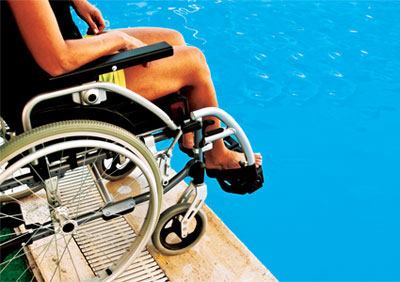As public pool owners and operators sit at the threshold of the ADA compliance deadline, some anticipate the immediate filing of lawsuits against companies that haven’t retrofitted their facilities.
Though the Americans with Disabilities Act was passed and signed in 1990, the federal government didn’t release specific language pertaining to public pools and spas until it published its 2010 ADA Standards for Accessible Design. The language states that public pools measuring less than 300 linear feet in perimeter must have at least one means of entry to accommodate disabled individuals. Pools with more than 300 perimeter feet need two methods of access.
The U.S. Department of Justice, the agency enforcing the law, originally required that existing facilities come into compliance by March 15, 2012. It then threw a curveball two months before the deadline, when officials stated that portable access lifts would not be considered compliant with the regulations, and instead required that all lifts be anchored into the deck.
After pushback from industry groups, especially those representing hotel and lodging, DOJ extended the deadline to May 21, 2012, with a second extension taking the due date to Jan. 31, 2013.
The deadline extensions met with objection and even protest from some disability rights organizations, which believed the hotel industry, in particular, was trying to skirt responsibility for making pools and spas accessible.
This time around, organizations representing the lodging and pool industries expect the deadline to stick. “We’re fairly confident that we’ve seen the last of the changes,” said Steven Getzoff, legal counsel for the Association of Pool & Spa Professionals and an attorney with Lester Schwab Katz & Dwyer, LLP, in New York.
There are concerns that the deadline may unleash a string of litigation pertaining to lifts. Generally speaking, the ADA is often cited in lawsuits aimed at hotels and other commercial and public facilities. “There’s been some abuse of [the ADA],” said Kevin Maher, senior vice president of governmental affairs for the American Hotel & Lodging Association in Washington, D.C. “We’ve seen, particularly in California and Florida, just a few firms or organizations that are filing hundreds and hundreds of lawsuits. A lot of them really just want a settlement. … We think that’s unfortunate because it’s not helping anybody in that case.”
With the pool lift requirement coming almost a year after enactment of the rest of the law, it’s possible that a series of suits will be filed shortly following the deadline. “It’s going to be pretty obvious whether [a facility] has the lift in place or not,” Maher said. “So I would expect to see to see a lot of new cases related to pool lifts initially.”
An attorney who represents hotels and motels said he is already involved in a lawsuit filed in early 2012 naming the ADA’s pool lift requirement. “Basically, the plaintiff’s lawyer was … looking at the ADA guidelines, saw that it’s going to require pool lifts and filed a suit,” said Marty Orlick, a partner in Jeffer Mangels Butler & Mitchell, LLP’s San Francisco office, and chairman of the firm’s ADA compliance and defense practice group.
Another client has been threatened with a lawsuit for not having a lift on a spa. Bringing the spa into compliance would involve more than the costs of adding a lift, he said. The property owner also would have to address a shortage of space. “It’s very complicated, and the spa doesn’t get used very often, so my client is considering filling in the spa,” Orlick said. “I’ve heard that from others as well: ‘What if I just close it? What if I tear it out and put in a barbecue pit?’”
While industry members were quick to recognize the value of the ADA, many are concerned about the few bad apples who try to take advantage. “Generally, the application of the ADA to businesses has been a positive thing. … It’s provided a fairer life for the disabled,” said Mark Stapke, a partner in Michelman & Robinson, LLP, in Los Angeles. “However, it’s subject to abuse, particularly in the case of smaller retailers like pool shops.”
Some individuals will visit several sites a day in search of ADA violations, file a suit and settle for a few thousand dollars, he said. Because of this, he believes the government should establish limits, based on criteria such as company or property size, on whom can be taken to court.
In the meantime, these organizations advise facilities to become compliant by the deadline, or pool opening if it comes later. If an ADA retrofit is not readily achievable, it’s recommended that owners put plans into place to bring their properties up to compliance by a later date.




